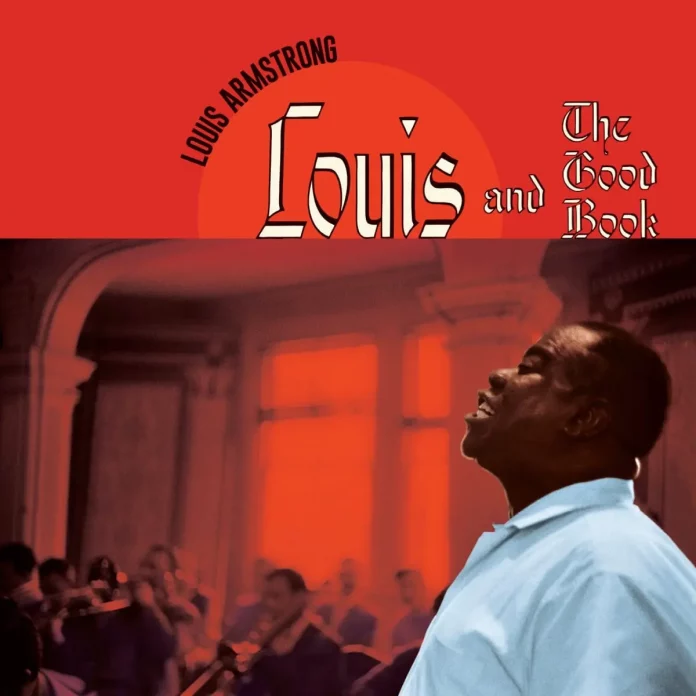The Good Book is paired, not for the first time on CD, with the album Louis And The Angels. There’s an apparent compatibility of theme but in fact, they’re quite dissimilar. In The Good Book, emphasis is firmly on gospel and traditional negro spirituals. The Angels is entirely secular, themed by the somewhat flimsy and restrictive idea of an entire selection of romantic popular ballads which include “angel” or “heavenly” in the lyrics.
By the 50s Decca was aiming to extend Armstrong’s appeal to a wider audience outside the jazz world. Louis took it all in his stride, his highly personalised interpretations transporting even unpromising material into Satchmo land with his familiar gravelly vocals, good humour and powerful, majestic trumpet.
The backing on The Good Book, basically the All Stars, (plus organ for gospel effect), swings along comfortably with effective arrangements by Sy Oliver, in his last collaboration with Armstrong. Nearly all tracks predominantly feature a compelling Armstrong vocal, with a tightly rehearsed studio choir added, incorporating gospel-styled dynamics in the call-and-answer responses. There are some striking, shortish passages of searing trumpet, notably in the upbeat On My Way and the moving Motherless Child. Never mawkish or sanctimonious with the religious lyrics, Louis’s vocals convey absolute sincerity, warmth and conviction, turning sometimes to exuberant old-school preacher exhortations, or to chuckling musing advice in homely, one-to-one intimacy.
A year earlier, in 1957, Louis had fronted Sy Oliver’s orchestra, which included violins, choir and harp, for The Angels. Assured and totally committed as ever, he delivers appealing and expressive vocals with a natural charm that sidesteps mere schmaltz. Fools Rush In is a gem. Soaring above pink clouds of ethereal choral ululations and swirling strings, the majestic trumpet, in solitary splendour, brings to life even lesser songs such as Angel Mia and Angel Child. He’s back on home base strikingly on Dear Old Southland, the closing bonus track from his just completed musical biography session, restored to its full, slightly extended length here.
The trumpet is awesomely powerful and commanding in its energising drive on these commercially slanted albums, which in particular showcase Louis’s exceptional skills as an entertaining, creative and versatile vocalist.
Discography
[Louis And The Good Book] (1) Nobody Knows The Trouble I’ve Seen; (2) Shadrack ; (3) Go Down, Moses; (2) Rock My Soul (In The Bosom Of Abraham); (3) Ezekiel Saw The Wheel; (2) On My Way; (1) Down By The Riverside; (3) Swing Low, Sweet Chariot; Sometimes I Feel Like A Motherless Child; (1) Jonah And The Whale; (2) Didn’t It Rain; (1) This Train; [Louis And The Angels] (4) When Did You Leave Heaven; You’re A Heavenly Thing; I Married An Angel; A Sinner Kissed An Angel; (5) Angela Mia; (4) Angel Child; (5) And The Angels Sing; (4) Fools Rush In; (5) I’ll String Along With You; Angel; The Prisoner’s Song; Good Night, Angel; (6) Dear Old Southland (78.57)
Armstrong (t, v) on all tracks, with:
(1) Trummy Young (tb); Dave McRae (cl); Billy Kyle (p); Nick Tragg (org); George Barnes (g); Mort Herbert (b); Barrett Deems (d); unidentified choir. NY, 4 February 1958.
(2) as (1) except Edmond Hall (cl) and Everett Barksdale (g) replace McRae and Barnes. NY, 6 February 1958.
(3) as (2) except Hank D’Amico (cl) replaces Hall. NY, 7 February 1958.
(4) George Dorsey, Phil Durso (f, as); Lucky Thompson (ts); Dave McRae (bar); Billy Kyle (p); Everett Barksdale (g); Joe Benjamin (b); Rudy Taylor (d); unidentified (hp); unidentified (vns); unidentified (choir). NY, 29 January 1957.
(5) as (4) except George Barnes (g) and Sid Block (b) replace Barksdale and Benjamin. NY, 30 January 1957.
(6) Billy Kyle (p). NY, 28 January 1957.
20th Century Masterworks 170068
















